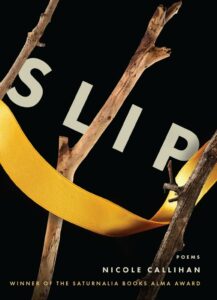
Review by Jiwon Choi
In Slip, Nicole Callihan, author of chigger ridge, This Strange Garment, SuperLoop, The Couples, and many more titles, offers up poems that are in full force of their elegant and vivid language, poems that are gleefully punchy and cranky, poems that reveal just how much upheaval we must deal with in the day to day living of our lives. Upheaval which we, as the poet reminds us, bring upon ourselves and bring upon others. This is revealed right away in the book’s beginning poem, “Stick”. The stick in question, found “at the mouth of the cave,” has been imbued with a Willy Wonka-esque gob stopping power to seemingly be and do everything, or at least, do so much:
made it into a gun and shot my brother,
nudged my brother to make sure he was dead,
nudged my brother to make sure he wasn’t dead,
…………………………………………..
whipped my knuckles with it
my thighs, dug little stars into my forearm,
…………………………………………..
let it touch me in places I had never
been touched, let it scratch the very itch it made,
…………………………………………..
danced with it instead of my father,
took it on my honeymoon, didn’t breathe a word of it
to my husband (3-4)
Yes, we are in awe of the stick’s capacity to pick up the slack, do the dirty work, and pave the way for some questionable acts, equal parts benign and weird, but ultimately we see the writing on the wall: the stick must go back to whence it came. But can it be that easy? Can you undo all that’s been done? Like Eve’s apple dangling in wait on a tree in Paradise, Calihan’s stick entices by the mouth of a cave.
But whereas the apple was a test, a trick, a comeuppance (call it whatever you wish), the stick could be seen as an invitation to enter and explore the cave. Coincidentally, caves, we are told, are what “all the good poems these days” are about (p.69), because who isn’t at least a little intrigued by a cave where “everything never happened” and “nothing ever happened” ?
Or more to the point, the cave is where we dare bear witness to what has been stirred up from the abyss: grievances, burdens, bedlam, old age, indifference, marriage, motherhood, giraffes, memory and grief. The abyss is inside us. We are inside the abyss. We are the abyss.
Much like the diver in Adrienne Rich’s “Diving into the Wreck” who has “read the book of myths/and loaded the camera/and checked the edge of the knife-blade,” and put on their diving suit, we think we are equally prepared (we have our stick) to see “the thing itself and not the myth.”
But how much of what’s come unleashed are we prepared to see? Practically speaking, how much can we take in?
Fear not as Callihan is a seasoned observer, an unflinching eye seeing both the thing itself and the myth, knowing we cannot fully tell our human story without creating some gauzy layers around us. We see this played out in the veraciously derivative and haunting “Hymn to Life,” where we are brought to as much clarity as to a lingering puzzlement over our human condition/situation. Yes, the abyss is inside us, but so are the hymns:
Another day for each day is subjective and there is a totality of days
And for each I mouth the words, for Sunday, Monday, and each
Comes and each goes, comes again, from my lips to god’s ears
The impermanence of permanence, is that all there is? To look
from one room into the next, the light spilling all over the kitchen
Floor
I want to ask what there is to be scared of, but I know this
Is the only question, and filtered through language, through this
Language, clear as day.
What I mistook,
And all that which was not mistaken. “Forsake me not.” O Air. “Why
Ask questions?” and, “What are the questions you wish to ask?” (54-65)
Do we read poetry to garner straight answers? Probably not. But can we gain a modicum of insight from them? Yes. And so this is where we have arrived, upon finding Eve, in the “Origin of Birds,” where she must deal with her own human condition/situation:
Just being inside Adam’s body, near his heart, enough.
Enough to be so near his heart, enough
to be part of something bigger––it was enough. (16)
This slippery notion of enough (in its pronoun, adjective, and adverb functions) has been with us since the beginning of time, and we’ll be musing over it until the very end. But here at least, Eve has come to realize “enough was no longer enough” and looks for what can be. What she finds is her will and desire for “something,” something as creation manifested through her wish: “the wish was enough to make the pinecone grow wings; the wish was enough to point to the sky, say bird, and wait for something to sing.” And eureka, we do.
Slip by Nicole Callihan
Saturnalia, 2025, $18 Paper
ISBN 9781947817760
Jiwon Choi is a poet, early childhood teacher, and urban gardener. She is the author of three poetry collections. Her most recent book, A Temporary Dwelling, was published by Spuyten Duyvil in 2024. She started her Brooklyn community garden’s first poetry reading series, Poets Read in the Garden, to support local writers during the early Covid years. She is an editor at Hanging Loose Press.
